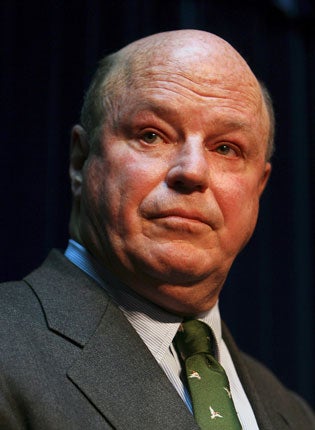US envoy's business link to Egypt
Obama scrambles to limit damage after Frank Wisner makes robust call for Mubarak to remain in place as leader.

Frank Wisner, President Barack Obama's envoy to Cairo who infuriated the White House this weekend by urging Hosni Mubarak to remain President of Egypt, works for a New York and Washington law firm which works for the dictator's own Egyptian government.
Mr Wisner's astonishing remarks – "President Mubarak's continued leadership is critical: it's his opportunity to write his own legacy" – shocked the democratic opposition in Egypt and called into question Mr Obama's judgement, as well as that of Secretary of State Hillary Clinton.
The US State Department and Mr Wisner himself have now both claimed that his remarks were made in a "personal capacity". But there is nothing "personal" about Mr Wisner's connections with the litigation firm Patton Boggs, which openly boasts that it advises "the Egyptian military, the Egyptian Economic Development Agency, and has handled arbitrations and litigation on the [Mubarak] government's behalf in Europe and the US". Oddly, not a single journalist raised this extraordinary connection with US government officials – nor the blatant conflict of interest it appears to represent.
Mr Wisner is a retired State Department 36-year career diplomat – he served as US ambassador to Egypt, Zambia, the Philippines and India under eight American presidents. In other words, he was not a political appointee. But it is inconceivable Hillary Clinton did not know of his employment by a company that works for the very dictator which Mr Wisner now defends in the face of a massive democratic opposition in Egypt.
So why on earth was he sent to talk to Mubarak, who is in effect a client of Mr Wisner's current employers?
Patton Boggs states that its attorneys "represent some of the leading Egyptian commercial families and their companies" and "have been involved in oil and gas and telecommunications infrastructure projects on their behalf". One of its partners served as chairman of the US-Egyptian Chamber of Commerce promoting foreign investment in the Egyptian economy. The company has also managed contractor disputes in military-sales agreements arising under the US Foreign Military Sales Act. Washington gives around $1.3bn (£800m) a year to the Egyptian military.
Mr Wisner joined Patton Boggs almost two years ago – more than enough time for both the White House and the State Department to learn of his company's intimate connections with the Mubarak regime. The New York Times ran a glowing profile of Mr Wisner in its pages two weeks ago – but mysteriously did not mention his ties to Egypt.
Nicholas Noe, an American political researcher now based in Beirut, has spent weeks investigating Mr Wisner's links to Patton Boggs. Mr Noe is also a former researcher for Hillary Clinton and questions the implications of his discoveries.
"The key problem with Wisner being sent to Cairo at the behest of Hillary," he says, "is the conflict-of-interest aspect... More than this, the idea that the US is now subcontracting or 'privatising' crisis management is another problem. Do the US lack diplomats?
"Even in past examples where presidents have sent someone 'respected' or 'close' to a foreign leader in order to lubricate an exit," Mr Noe adds, "the envoys in question were not actually paid by the leader they were supposed to squeeze out!"
Patton Boggs maintains an "affiliate relationship" with Zaki Hashem, one of Egypt's most prominent legal firms. It was founded in 1953 and Zaki Hashem himself was a cabinet minister under Mubarak's predecessor, President Anwar Sadat, and later became head of the Egyptian Society for International Law.
By a further remarkable irony, one of Zaki Hashem's senior advisers was Nabil al-Araby, one of the 25 leading Egyptian personalities just chosen by the protesters in Tahrir Square to demand the overthrow of Mubarak. Nabil al-Araby, a former member of the UN's International Law Commission, told me yesterday that he ended his connection with Zaki Hashem three years ago and had "no idea" why Mr Wisner had come out in support of Mubarak's continued rule. He himself believed it was essential Mubarak make a dignified but immediate exit. "The head must go," he said.
When Frank Wisner joined Patton Boggs in March 2009, the company described him as "one of the nation's most respected diplomats" who would provide clients with "strategic global advice concerning business, politics and international law". The firm stated specifically that "it looks to Ambassador Wisner to use his expertise in the Middle East and India to assist its American and international clients."
Stuart Pape, managing partner at Patton Boggs, said at the time that "it is a real coup for the firm to have Ambassador Wisner – one of the most experienced and highly regarded diplomats – join our ranks... His in-depth knowledge of global politics and the international financial world is a huge asset for our clients."
We still do not know exactly what kind of "expertise" he has bestowed upon the dictator of Egypt. But his remarks at the weekend leave no room to doubt he advised the old man to cling on to power for a few more months. The vast network of companies with family connections to Mubarak's regime is, of course, one of the targets of the pro-democracy demonstrators in Egypt.
A spokesman for the State Department said he "presumed" Mrs Clinton knew of Mr Wisner's employment by Patton Boggs and the firm's links with the Mubarak government, but refused to comment on any conflict of interest for the envoy. A spokesman for Patton Boggs could not be reached yesterday.
Join our commenting forum
Join thought-provoking conversations, follow other Independent readers and see their replies
Comments
Bookmark popover
Removed from bookmarks